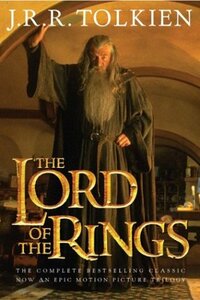You need to sign in or sign up before continuing.
Take a photo of a barcode or cover
adventurous
emotional
hopeful
slow-paced
Plot or Character Driven:
A mix
Strong character development:
Yes
Loveable characters:
Yes
Diverse cast of characters:
No
Flaws of characters a main focus:
No
adventurous
emotional
funny
mysterious
slow-paced
Plot or Character Driven:
A mix
Strong character development:
No
Loveable characters:
Yes
Diverse cast of characters:
Yes
Flaws of characters a main focus:
Complicated
What a trip, literally. The books differ from the movies and make the story that much better. Tolkien's ability to write beautiful prose that are easy and accessible is an underestimated skill and while the book can get stuck in the weeds of his prose, it is so fun to be stuck. His incredible power of imagination is so impressive and lends the story and book that much depth which only adds to the reading experience. An incredible work.
adventurous
challenging
dark
emotional
funny
hopeful
inspiring
mysterious
sad
tense
slow-paced
Plot or Character Driven:
A mix
Strong character development:
Yes
Loveable characters:
Yes
Diverse cast of characters:
Yes
Flaws of characters a main focus:
Yes
4/10.
JRR Tolkien’s fantasy classic has its strengths, to be sure—some of the ideas are really imaginative and there’s tons of potential. Tolkien is great at setting up a world and dropping you into it, creating fantasy locations you want to spend time in, and spinning something new out of old fantasy tropes such as broken swords, grey wanderers and cursed jewellery. There are some beautiful passages of lyrical and clever dialogue, such as exchanges between Gandalf and Saruman or the hobbit dialogue. His use of etymology to name characters, objects and places is pretty cool too. Unfortunately, he’s not a particularly good novelist.
Tolkien’s chief interest is linguistics, heritage and anthropology, so he emphasizes those elements while neglecting others. The books have endless verbose descriptions, a formulaic storyline, and meandering, repetitive passages. Aside from Gollum, the hobbits, and Boromir, the characters are nearly lifeless; a cardboard cutout without passion, faults, or idiosyncrasies. Themes aren’t particularly forward-thinking either, except for his environmentalism. The biggest detractor by far, though, is editing. Tolkien over-explains nearly everything that pops up in the story, spoiling scenes that should be tense or scary or mysterious. For example: at one point a huge, monstrous spider is encountered in a pitch-black cave. That should be terrifying, but Tolkien shoots himself in the foot by giving the spider a long, convoluted backstory about how it got there, why it’s there, what Sauron thinks of it, and what kinds of meat it prefers over others. This information is irrelevant to the characters who encounter it, and completely robs the scene of tension or intrigue. It’s like if a magician explained a trick in a bored voice while performing it, and Tolkien does it often. There are lots of cool concepts, epic locales, and intriguing visuals throughout the series. It's just a shame that Tolkien’s pedantry casts a pall over most of it.
Even the editing of the fundamental structure of the book is detrimental. After the fellowship splits up and an “A Story, B Story” pattern emerges, Tolkien adapts a unique approach for inter-cutting. He dedicates about 200 uninterrupted pages to one group of characters, and then alternates over to the other group, rather than switching perspective for every chapter. It works well in The Two Towers, emphasizing the distance between groups, illustrating how they’re on self-contained quests, and also preventing the rising action in their plot-lines from being interrupted.
This same approach ruins tension during Return of the King, and deals a huge blow to the climax of the story. This is mainly because, in RotK, the characters have the same goal, ultimately end up near the same place, and their actions directly impact the other group. It would have been so effective to cut between the two major character groups frequently as they all converged on Mordor for the final confrontation. Instead, one group basically has its huge climax—lots of action and drama, rising to a crescendo where the stakes are at their highest—and then the narrative jumps WAAAAY back in timeline so that we can watch Sam and Frodo hobbling around the Mordor badlands (hands down the most boring stretch of the series), only to painstakingly take us back to the same point we were at many chapters ago. It completely kills the momentum of the Return of the King, especially knowing that all the major battle scenes are over. As a result, the final stretch of LOTR feels lopsided and tedious, when just a bit of re-structuring would have made the climax so much more intense and readable. Throughout the series, many scenes meander, and sometimes entire chapters are just begging to be cut.
It makes me sad to think how much better the Lord of the Rings could’ve been had Tolkien worked with an editor. Unfortunately, Tolkien’s pedantic, verbose approach to storytelling will turn off many readers and make it hard to appreciate the positive aspects. I can’t recommend this series to anyone unless they have an insatiable interest in long-winded fantasy books. But if that’s the case, they’ve probably already read and enjoyed Lord of the Rings. In spite of this, there are basic ideas I still cherish contained in LOTR. I can better appreciate them in the movies, though.
JRR Tolkien’s fantasy classic has its strengths, to be sure—some of the ideas are really imaginative and there’s tons of potential. Tolkien is great at setting up a world and dropping you into it, creating fantasy locations you want to spend time in, and spinning something new out of old fantasy tropes such as broken swords, grey wanderers and cursed jewellery. There are some beautiful passages of lyrical and clever dialogue, such as exchanges between Gandalf and Saruman or the hobbit dialogue. His use of etymology to name characters, objects and places is pretty cool too. Unfortunately, he’s not a particularly good novelist.
Tolkien’s chief interest is linguistics, heritage and anthropology, so he emphasizes those elements while neglecting others. The books have endless verbose descriptions, a formulaic storyline, and meandering, repetitive passages. Aside from Gollum, the hobbits, and Boromir, the characters are nearly lifeless; a cardboard cutout without passion, faults, or idiosyncrasies. Themes aren’t particularly forward-thinking either, except for his environmentalism. The biggest detractor by far, though, is editing. Tolkien over-explains nearly everything that pops up in the story, spoiling scenes that should be tense or scary or mysterious. For example: at one point a huge, monstrous spider is encountered in a pitch-black cave. That should be terrifying, but Tolkien shoots himself in the foot by giving the spider a long, convoluted backstory about how it got there, why it’s there, what Sauron thinks of it, and what kinds of meat it prefers over others. This information is irrelevant to the characters who encounter it, and completely robs the scene of tension or intrigue. It’s like if a magician explained a trick in a bored voice while performing it, and Tolkien does it often. There are lots of cool concepts, epic locales, and intriguing visuals throughout the series. It's just a shame that Tolkien’s pedantry casts a pall over most of it.
Even the editing of the fundamental structure of the book is detrimental. After the fellowship splits up and an “A Story, B Story” pattern emerges, Tolkien adapts a unique approach for inter-cutting. He dedicates about 200 uninterrupted pages to one group of characters, and then alternates over to the other group, rather than switching perspective for every chapter. It works well in The Two Towers, emphasizing the distance between groups, illustrating how they’re on self-contained quests, and also preventing the rising action in their plot-lines from being interrupted.
This same approach ruins tension during Return of the King, and deals a huge blow to the climax of the story. This is mainly because, in RotK, the characters have the same goal, ultimately end up near the same place, and their actions directly impact the other group. It would have been so effective to cut between the two major character groups frequently as they all converged on Mordor for the final confrontation. Instead, one group basically has its huge climax—lots of action and drama, rising to a crescendo where the stakes are at their highest—and then the narrative jumps WAAAAY back in timeline so that we can watch Sam and Frodo hobbling around the Mordor badlands (hands down the most boring stretch of the series), only to painstakingly take us back to the same point we were at many chapters ago. It completely kills the momentum of the Return of the King, especially knowing that all the major battle scenes are over. As a result, the final stretch of LOTR feels lopsided and tedious, when just a bit of re-structuring would have made the climax so much more intense and readable. Throughout the series, many scenes meander, and sometimes entire chapters are just begging to be cut.
It makes me sad to think how much better the Lord of the Rings could’ve been had Tolkien worked with an editor. Unfortunately, Tolkien’s pedantic, verbose approach to storytelling will turn off many readers and make it hard to appreciate the positive aspects. I can’t recommend this series to anyone unless they have an insatiable interest in long-winded fantasy books. But if that’s the case, they’ve probably already read and enjoyed Lord of the Rings. In spite of this, there are basic ideas I still cherish contained in LOTR. I can better appreciate them in the movies, though.
adventurous
challenging
slow-paced
Plot or Character Driven:
Plot
Strong character development:
No
Loveable characters:
Complicated
Diverse cast of characters:
Complicated
Flaws of characters a main focus:
No
adventurous
challenging
emotional
hopeful
inspiring
sad
slow-paced
Plot or Character Driven:
A mix
Strong character development:
Yes
Loveable characters:
Yes
Diverse cast of characters:
Yes
Flaws of characters a main focus:
Yes
adventurous
dark
inspiring
mysterious
medium-paced
Plot or Character Driven:
A mix
Strong character development:
Yes
Loveable characters:
Yes
Diverse cast of characters:
No
Flaws of characters a main focus:
No
How can a series be so incredible but also so ass at the same time. There is of course the classic 50s mix of underlying racism, though that didn’t bother me so much. Sometimes the book would drag, the prose would wind, and the point would be missed. But other times the story would inspire an epic sense of defiance and hope in the face of utter defeat. It is a masterpiece undoubtedly, but a masterpiece so riddled with flaw and marred with over-sincere characters and roundabout prose.
adventurous
tense
slow-paced
Plot or Character Driven:
Plot
Strong character development:
No
Loveable characters:
Yes
Diverse cast of characters:
N/A
Flaws of characters a main focus:
No
3,5 stjerner. Er jo en klassiker. Elsker legolas og gimli, dynamikken deres er veldig underholdende. Entene er også fantastiske, en av favorittrasene mine av alle de forskjellige i Midgard.
Er en bra bok, men helt utrolig seig til tider. Tror deler skylder oversettelsen. Leste den på norsk, var mye firkanta språk. Leste deler på engelsk, og virket mye bedre, men den norske oversettelsen var ganske meh. Kanskje lese på engelsk en gang og oppgradere scoren.
Er en bra bok, men helt utrolig seig til tider. Tror deler skylder oversettelsen. Leste den på norsk, var mye firkanta språk. Leste deler på engelsk, og virket mye bedre, men den norske oversettelsen var ganske meh. Kanskje lese på engelsk en gang og oppgradere scoren.
adventurous
medium-paced
Plot or Character Driven:
A mix
Strong character development:
Yes
Loveable characters:
Yes
Diverse cast of characters:
Yes
Flaws of characters a main focus:
No






